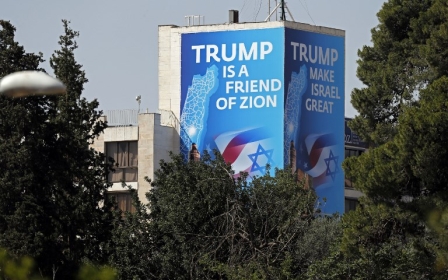Israelis begin 'Jerusalem Day' marches as clashes erupt in Old City

Clashes broke out in Jerusalem on Sunday as Israelis marched through the Old City on Jerusalem Day, which marks the 1967 annexation of East Jerusalem.
A confrontation took place at the entrance to Al-Aqsa compound between Israeli police and the Waqf, the body that manages sites Islamic sites there. Rioting erupted after police removed a group of Israelis who had been praying in the compound, something which is forbidden by Israel.
Tens of thousands were expected to take part in broader marches on Sunday which Israelis hold to mark the annexation of East Jerusalem after the 1967 Arab-Israeli War. The annexation was never recognised by the international community.
The annual event comes at a time of heightened tensions between Israelis and Palestinians. On Sunday, US President Donald Trump's daughter, Ivanka Trump, and her husband, Jared Kushner, arrived in Jerusalem to attend the opening of the US embassy there on Monday.
Palestinians meanwhile readied for their own protests on Monday over the embassy's inauguration, which will take place on the 70th anniversary of Israel's founding.
The date is also the 70th anniversary of the Palestinian Nakba (catastrophe) in which more than 750,000 Palestinians were forcibly displaced by Israeli forces.
A final mass demonstration in the Gaza Strip near the border with Israel was planned for Monday, the culmination of six weeks of Palestinian protests in the build-up to the event and to call for the right of return of those Palestinian refugees driven from their homes in the event.
Trump's decision to move the US embassy to Jerusalem and recognise the city as the capital of Israel fulfilled a campaign promise but has dismayed Palestinians and other countries as a blow to peace efforts.
Israel considers the entire city its capital, while the Palestinians see East Jerusalem as the capital of their future state.
Speaking to journalists in the Old City, Jerusalem Mayor Nir Barkat hailed the US embassy move as the beginning of "a new world order and new order in the Middle East".
For Israelis, the celebration of Jerusalem Day and the 1967 "reunification" of the city takes on added significance due to the embassy move the following day.
The annual march to the Western Wall includes many hardline religious nationalists who oppose a Palestinian state, often resulting in clashes as they pass through mainly Palestinian East Jerusalem.
'Capital of our people'
Israeli Prime Minister Benjamin Netanyahu - bolstered in recent days by Trump's withdrawal from the Iran nuclear deal - opened a special cabinet meeting at Jerusalem's Bible Lands Museum by again lauding the embassy move.
"Jerusalem is mentioned in the Bible approximately 650 times," Netanyahu said.
"The reason is simple: For over 3,000 years it has been the capital of our people, and only of our people."
Police and the Israeli military planned major security deployments.
Around 1,000 police officers will be positioned around the US embassy and surrounding neighbourhoods for Monday's inauguration, said spokesman Micky Rosenfeld.
Israel's army said it would almost double the number of troops surrounding the Gaza Strip and in the occupied West Bank.
Sunday’s clashes broke out as Israelis visited the Haram al-Sharif holy compound in East Jerusalem's Old City, known to Jews as the Temple Mount.
Jews are allowed to visit the site but not pray there to avoid provoking tensions, and police said a number of visitors were removed for not following the rules.
"It is not a provocation. It's our property," said Nili Naoun, 42, an Israeli who arrived at the holy site with her family at 7am.
A number of Palestinian shop owners in the Old City said they planned to close when the march passed through in case anyone tried to vandalise their shops, as has occurred in the past.
Weeks of tension
Tensions have been building in the run-up to the embassy opening. Fifty-four Palestinians have been killed in protests and clashes since March 30 along the Gaza Strip's border with Israel.
No Israelis have been wounded and the military has faced criticism over the use of live fire.
Israel says it only opens fire when necessary to stop infiltrations, attacks and damage to the border fence while accusing Hamas, the movement that runs the blockaded Gaza Strip, of seeking to use the protests as cover to carry out violence.
On Sunday, Hamas leader Ismail Haniya headed to Cairo for talks amid speculation over whether Egypt is attempting to calm the situation.
The embassy move has provoked Palestinian anger and led them to freeze ties with the White House.
But the US ambassador to Israel, David Friedman, who has been a supporter of Israeli settlements in the West Bank, said he believed the Palestinians' position "will change over time".
He told Fox News the United States "is there to help the Palestinians" and "there is no basis" to think the embassy move will work against peace.
Jerusalem's status is perhaps the thorniest issue in the Israeli-Palestinian conflict.
In the decades since 1967, international consensus has been that the city's status must be negotiated between the two sides, but Trump broke with that to global outrage.
Like Friedman, he has argued that it helps make peace possible by taking Jerusalem "off the table," but many have pointed out that he has not announced any concessions in return from Israel.
Stay informed with MEE's newsletters
Sign up to get the latest alerts, insights and analysis, starting with Turkey Unpacked
Middle East Eye delivers independent and unrivalled coverage and analysis of the Middle East, North Africa and beyond. To learn more about republishing this content and the associated fees, please fill out this form. More about MEE can be found here.






